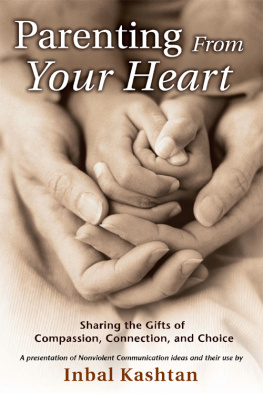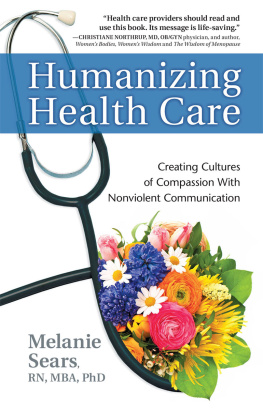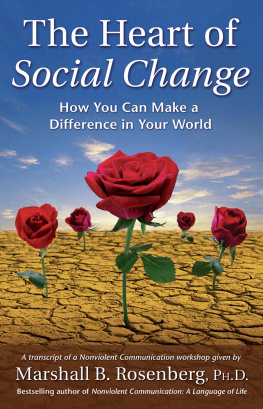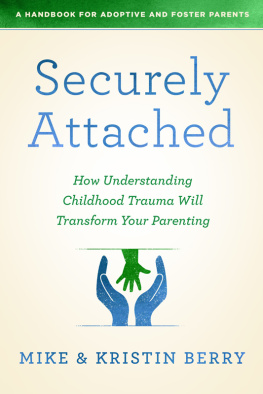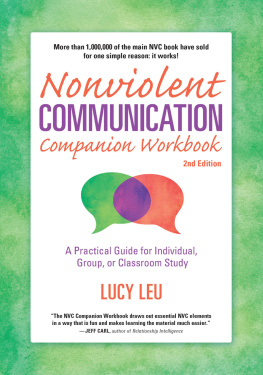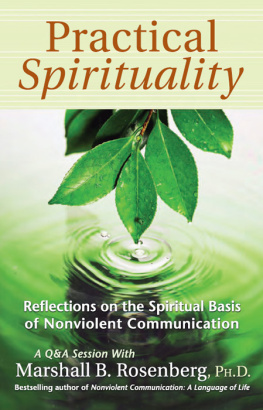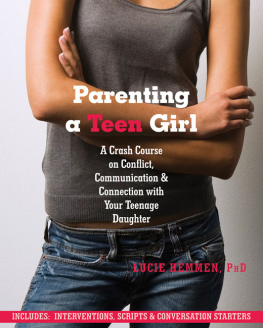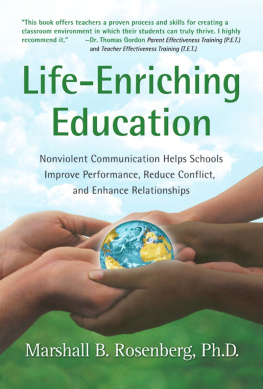
For additional information:
Center for Nonviolent Communication
5600 San Francisco Rd. NE Suite A, Albuquerque, NM 87109
Ph: 505-244-4041 Fax: 505-247-0414 Email: cnvc@cnvc.org Website: www.cnvc.org
ISBN: 978-1-892005-08-3
Copyright 2005 PuddleDancer Press
Published by arrangement with the Center for Nonviolent Communication. All rights reserved.
No part of this booklet may be reproduced by any means, nor may it be stored,
transmitted or otherwise copied without permission of the publisher.
Contents
Parenting From
Your Heart

Introduction
H ow can we deal with our two-year-old when she grabs her friends toys? What might we say to a four-year-old who refuses to let other children slide on the playground? How can we talk with a teenager about the chores he has left undoneagain? How do we protect our children when their choices endanger their safety? What resources will help us work with our own anger, frustration, or pain when communication with our children seems strained or non-existent?
As parents, we are constantly faced with situations like these. Multiply the children and the challenges mount. Add the pressures of work (or unemployment), money (or lack thereof), time, relationships, and other commitments, and the pot threatens to boil over. Then, for some, there are the stresses of raising children alone, without a partner, extended family, or community. And there are myriad additional challenges many parents face. It is no wonder parents yearn for support, guidance, and relief. Yet when we turn to parenting books or experts, the advice we find is often contradictory and may not align with our own values and hopes for our children and families. Even when we do find an idea we want to try, changing habits and patterns in relationships can be enormously challenging in itself.
In this booklet, I present to parents and others who are connected with children a brief introduction to how Nonviolent CommunicationTM (NVC) may support their parenting in practical, immediate ways. I particularly hope to address parents yearning for deeper connection with themselves, their partners, and their children, and their desire to contribute, through parenting, to fostering peace in the world. The approach I describe, as you will see, goes beyond immediate solutions and into the realm of personal and social transformation.
This booklet explores a variety of topics and situations and offers ten exercises to help you put into practice what you are learning as you shift or adapt your parenting approaches. However, it is by no means a comprehensive exploration of NVC and parenting. I have not touched upon many topics that have come up in my workshops and classes, on the NVC-parenting email list, and in my own life. I hope, nonetheless, that what I have covered here will be practical enough to offer you some concrete tools for deepening connection with your children, and exciting enough to encourage you to consider learning even more. If you choose to put these ideas into practice and they make a difference in your family life, I would love to hear from you.
For a review of the basic steps of NVC and additional information on NVC, see the back of the booklet.
Power-Over versusPower-With
When parents want children to do something their children dont want to do, its often tempting to force the childrens compliance by using the enormous physical, emotional, and practical power adults have over them (by practical, I mean that adults have much greater access to societys resources and control over the course of their ownand their childrenslives). Yet I am convinced that attempting to coerce a child to do something she or he doesnt want to do neither works effectively in the short term nor supports families long-term needs. (The only exception comes when there is threat to health or safety, in which case NVC suggests that we use non-punitive, protective force.) In NVC, we refer to using power to enforce what we want as Power-Over, in contrast with using power to meet everyone needs, which we refer to as Power-With.
Maria, a parent who had read some of my articles, asked me a question that points directly to the temptation to use the control we have over resources to influence a childs behavior (note that all peoples names have been changed):
Ive been bargaining with my two-year-old son Noel using rewards and consequences, and sometimes it seems to me that its quite effective. At least, it gets him to do what I want, such as eat the food on his plate. Yet Im somehow uncomfortable with this. Is there a problem with rewards and consequences if they work?
I do think that there is a problem with rewards and consequences, because in the long run, they rarely work in the ways we hope. In fact, I think that they are likely to backfire. Marshall Rosenberg explores this point by asking parents two questions: What do you want your child to do? and What do you want your childs reasons to be for doing so? Parents rarely want their children to do something out of fear of consequences, guilt, shame, obligation, or even a desire for reward.
In this context, when I hear parentsor parenting expertssay that consequences are effective, I often wonder what they mean. I believe effective usually means that parents get compliance from childrenthat children do what parents tell them to doat least for a while. Both the goal (compliance) and the means (rewards and consequences) come at a price. They not only involve fear, guilt, shame, obligation, or desire for reward, they are also often accompanied by anger or resentment. And because rewards and consequences are extrinsic motivations, children become dependent on them and lose touch with their intrinsic motivation to meet their own and others needs.
I believe that the most powerful and joyful intrinsic motivation human beings have for taking any action is the desire to meet our own and others needs. Both children and adults act out of this intrinsic motivation when they feel genuinely connected to themselves and each other, when they trust that their needs matter to the other, and when they experience the freedom to choose to contribute to the other.
If we want our children to experience intrinsic motivation for doing what we ask them to do, we can shift our focus away from authority and imposed discipline and toward paying as much attention as possible to everyones long-term needs. This may take more time in the moment because it means going beyond the present problem and remembering what matters most in the big picture. Yet the time is worth the investment. In the long run, families can experience deeper connection, trust, and harmony, and children can learn powerful life skills. I believe that most parents find these goals much more appealing and exciting than mere compliance.
Instead of rewards and consequences, NVC offers three starting places for connecting with others: offering empathy, expressing ones own observations, feelings, needs, and requests, and connecting with oneself through self-empathy. In the next three sections, I will explore each of these options in relation to the question Maria asked me.
Empathy for a Child
Empathizing with another person opens the door to deep understanding and connection. When Maria approaches Noel, she can begin with the premise that some of his needs are not being met. Even with a toddler or a child not used to NVC language, a parent is likely to be able to ferret out his needs.

